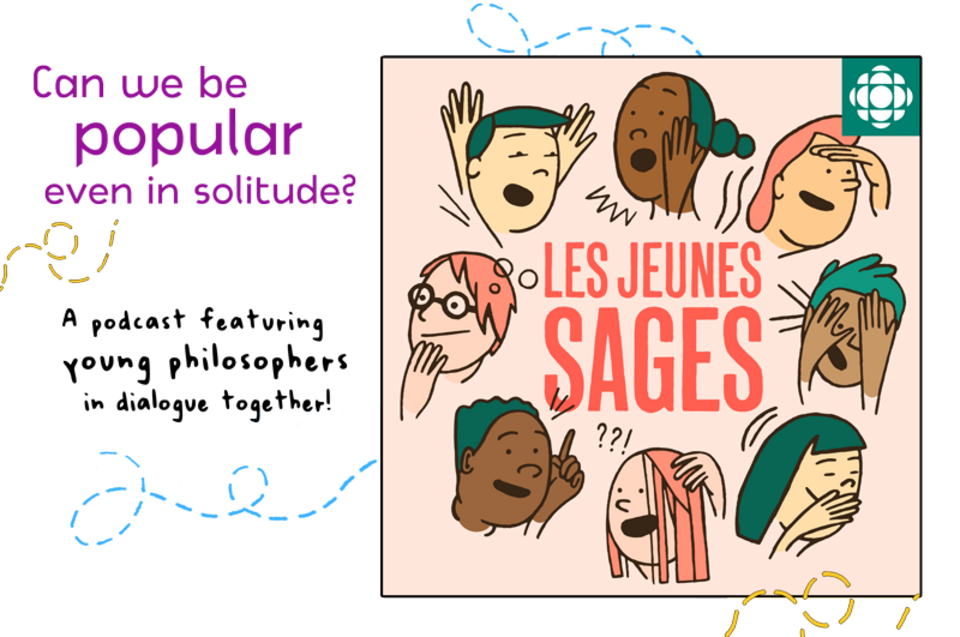
Solo or together
| Objective: To feed your philosophical reflections on solitude with your family's help during lunch! |
Duration : 30 to 75 minutes
Material :
-
Sheets of paper and pen
-
Coloured pencils and markers
-
Your family
Instructions :
It's time to eat! Gather your family around the table for a delectable dialogue about solitude. Explore the following questions, finding inspiration in the thinking prompts as necessary. Together, think of reasons to explain your positions and try to build an answer by combining your ideas! But don't worry if the urge to keep talking doesn't subside... philosophical picnics are an insatiable quest!
...
- Question 1: Is it possible to be truly alone?
- Thinking prompts : Have you ever heard mysterious stories about a baby who was raised in total isolation, or about a person who was alone on a desert island for months on end? Do you think these are examples of true solitude? Why or why not? Think about activities that can be done alone—sleeping, reading a book, going for a walk in the forest, etc. Are we really alone in these cases? Or can nature, the author of a book, words, or even our dreams be a form of companionship? Hmm... maybe it all depends on what we mean by solitude... go back to your definition from this morning's Idea Stretching and compare it to the definitions suggested by your family members!
-
Question 2: What is the difference between being alone and being lonely?
- Thinking prompts: Is it true that you can sometimes feel lonely even in a crowd? What could explain this feeling? Conversely, perhaps a loner can enjoy their moments in isolation so much that they feel accompanied—by ideas, ambitions, memories. So what would be the difference between being alone and being lonely? With your family, try to imagine two people experiencing the same situation of solitude differently: one is alone but happy to be by themselves, while the other finds the feeling of solitude very negative. Imagine their feelings, thoughts and motivations together, and make sure to describe how they each see the situation in their own way. Is it better to be alone but happy than to be in good company but unhappy? Hmm... maybe we're assuming that solitude is negative...
- Question 3: When are we the best version of ourselves—when we are alone or with others?
- Thinking prompts: Are there things that should be done only alone, or always with others? If so, why and according to what criteria? Society tends to celebrate very independent people who say they are self-made and owe their success to themselves only. But is it necessarily an advantage to do everything alone? Think among yourselves about when you feel most motivated, focused, effective or satisfied. Is it when you work alone or in a team? What are the advantages and disadvantages of each type of work? What if we imagine a world where all humans suddenly disappeared, leaving you alone in the world? Then try to finish the sentence: If I were the only person in the world then ____________.
...
Bonus : Does your family work well together? Now is the time to prove it... with the most ridiculous game possible! Imagine that you are a family of clowns who really like to work closely together on a lot of different things! Find out what happens when several of you do tasks that are usually done alone. How many clowns does it take to: ...take a huge bite of the same apple? ...brush one mouth's teeth? ...tie one shoe's laces? Improvise a mini-skit for each scenario, exaggerating your gestures and expressions as much as possible. Afterwards, ask yourselves: Is it better to do some things alone or to share all your experiences with others? |

| Tricks for tots : Can we meet up in our imagination? As a family, to help you imagine yourselves less alone in your head, think about how you help each other, even when you're not together. This is your mental advisory committee—your head council! Does Mom's voice help you when you're alone facing a tough time? And do you remember Dad's athletic tricks when you're eager to win your school race? Or does your sister's funny song come to mind when you're stressed out without her? What about your pets—do they help you from afar? Compare your answers to see how your presence is felt even in your absence! |
| Tips for teens : Parlez-vous français ? As you prepare your meal or digest your feast of delicacies and tasty ideas, listen to the Les jeunes sages podcast on popularity. Drawing inspiration from the reflections of the young philosophers, try to answer the question: Can popularity prevent us from being authentic? Do you agree or disagree with the answers given by the participants? Try to think of lines of thinking that have not been addressed... What other angles of the concept of popularity deserve to be explored? Perhaps wonder about the link between popularity and solitude... Can popularity be lonely? Can we be popular even in solitude? If you can't understand French, don't worry! You can still wonder about these questions! You can even imagine that you are recording a podcast with your family... Family Wisdom! |
Share your creative reflections by sending them via email.
Include photos of your projects and notes of your thoughts, as well as your first name and your age!


